This Blu-ray box set is currently available from Arrow Video.
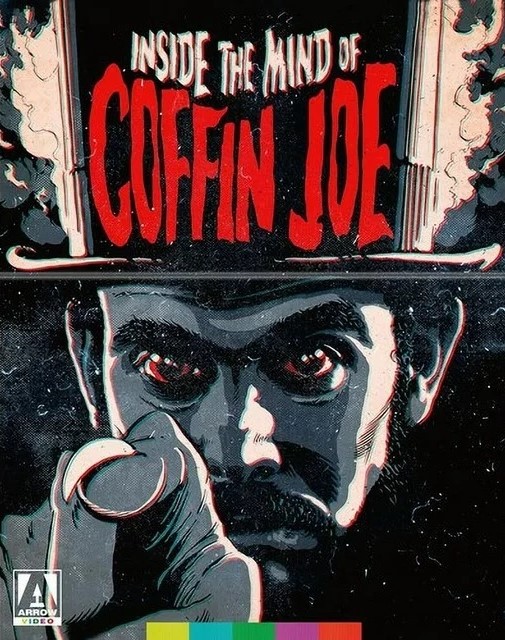
Back in 1964, independent writer/director José Mojica Marins created the first Brazilian horror film. He also starred in the movie as the main character, a sinister figure known as Zé do Caixão aka Coffin Joe. Despite its low budget, the movie was successful and helped establish the character, who soon became a popular TV host. This and other titles helped cement the filmmaker’s reputation as something of a horror maverick (even though he did make pictures in a variety of genres).
Still, the character wasn’t particularly well respected in Brazil and little known to the rest of the world. Many of his productions were graphic, presented less-than-flattering views of Brazil and were made under a military dictatorship, resulting in numerous conflicts with his government. Yet over time, horror movie enthusiasts from other countries became fascinated by Marins and his very unique pictures with counterculture overtones, eventually resulting in cult status. Marins is now more respected and well-known outside of his homeland than in Brazil. Arrow Video has decided to pay tribute to a filmmaker (he passed away in 2020) who captured the imagination of the horror fans by restoring and releasing 10 of his pictures in the new Blu-ray box set Inside the Mind of Coffin Joe.
These films were cobbled together and completed by the filmmaker with limited funds and under great duress, so they don’t appear quite as polished as your typical Hollywood title. However, the 4K restorations from the best available elements (including camera negatives and/or interpositives) are certainly better than expected, with some titles looking quite striking. Overall, these movies look as good as they ever have (or perhaps ever will) in this Blu-ray set.
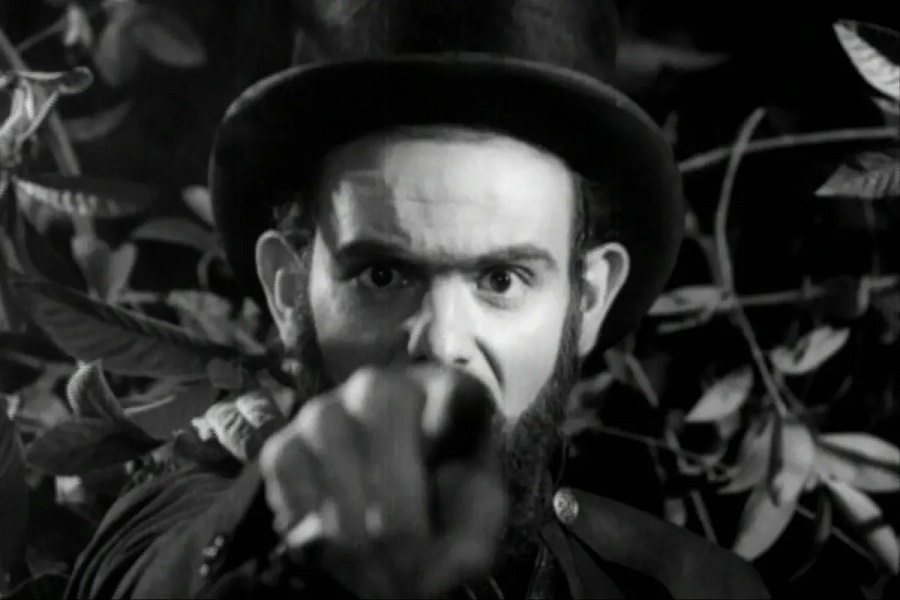
The first Blu-ray contains the black and white creeper At Midnight I’ll Take Your Soul (1964), which marked the debut of nasty, smalltown undertaker Coffin Joe. The story is relatively simple, with Marins’ character dressed in black with a cape and top hat, along with disturbingly long fingernails. It seems that the atheistic villain hates religion, openly mocking those who follow Catholic rites. Obsessed with immortality through the creation of a perfect male child, he murders his infertile wife and stalks women he considers worthy of his lineage. This involves dispatching various ladies and threats while undertaking his mission.
As mentioned, the movie is anything but subtle with Coffin Joe frequently yammering about his beliefs (often contradicting himself over the course of the film series). However, the movies do possess visual style and several memorable moments. The slayings, which include eye-gouging and other bits of nastiness are grotesque for the time, and even though his garb is a bit silly, the lead is a menacing villain. His views, which bear some similarity to those espoused by Friedrich Nietzsche (and later the Nazi party), are chilling to hear. The filmmaker also uses close-ups and has both Coffin Joe and his central foe (and old gypsy fortune-teller) directly address the camera in a surprisingly effective manner. There’s nothing subtle about the character (one wonders why anyone wouldn’t just leave immediately anytime he enters a room), but it’s an original and effective film.
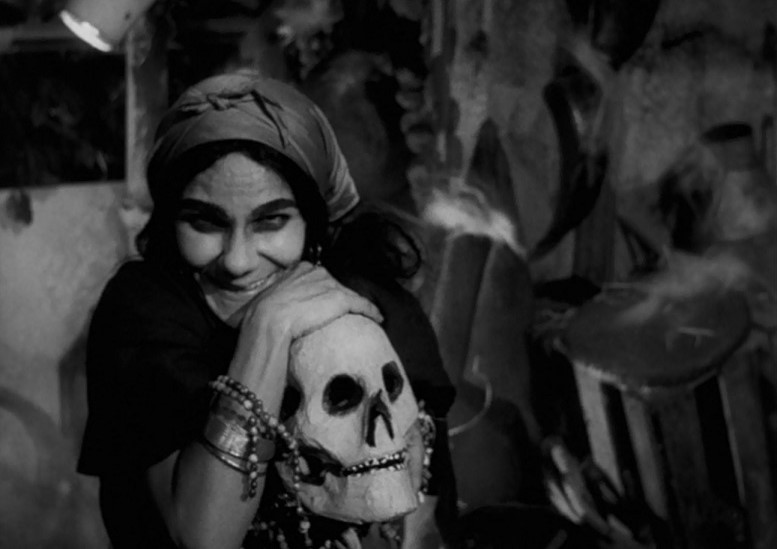
Extras on this disc include an archived audio commentary from writer, director and star Marins, as well as an informative documentary on the man called Damned: The Strange World of José Mojica Marins. It gives a general overview of the filmmaker and his career, noting that his parents ran a movie theater and that essentially living at a theater likely informed who he was and what he wanted to do in life. He made his films out of a self-made studio homebase in Sao Paulo and often cast his friends as leads.
Viewers also learn about how the filmmaker managed to stretch his production budgets and the difficulties he encountered getting projects finished and released. When Coffin Joe became familiar to audiences in the country, Marins essentially went into method acting mode to promote his titles. This would include giving reporters the impression that he really was a madman. It also seems that Marins put all of his personal money into his films and sometimes was forced to sell his shares in the movie to complete them. As a result, despite a few projects being financially successful, he never really attained much wealth over his lifetime. It’s all interesting to hear and gives a clearer sense of Marins’ extreme efforts to reach audiences. There is also an early short from the filmmaker and excerpts of other productions, as well as a trailer.
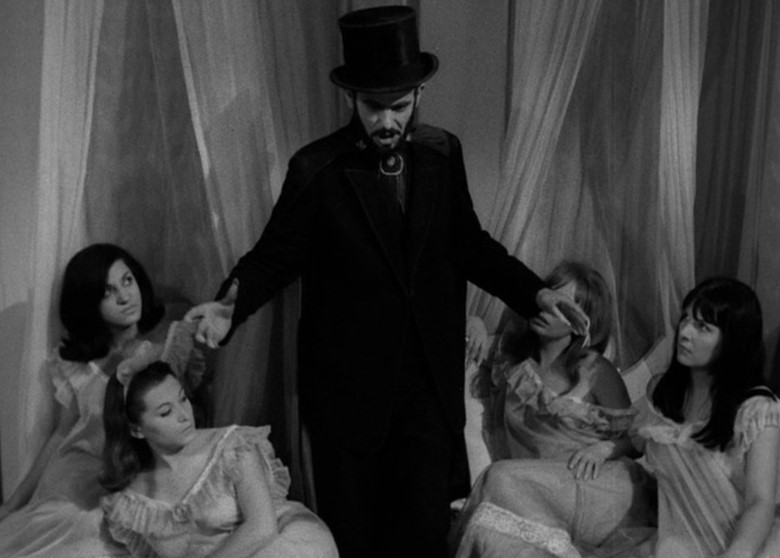
This Night I’ll Possess Your Corpse (1967) was a sequel that sees Coffin Joe being saved by doctors after the events of the previous film and returning to his hometown. His acts become even more extreme (if that is even possible) when he employs a henchman, kidnaps a group of women, takes them to his home and forces them to endure a series of demented tests to prove themselves worthy of his seed. One of the ladies who fails his trials vows to return from the dead and seek revenge. Despite being an atheist, Coffin Joe becomes increasingly paranoid, having nightmarish visions and eventually falling prey to the supernatural threat.
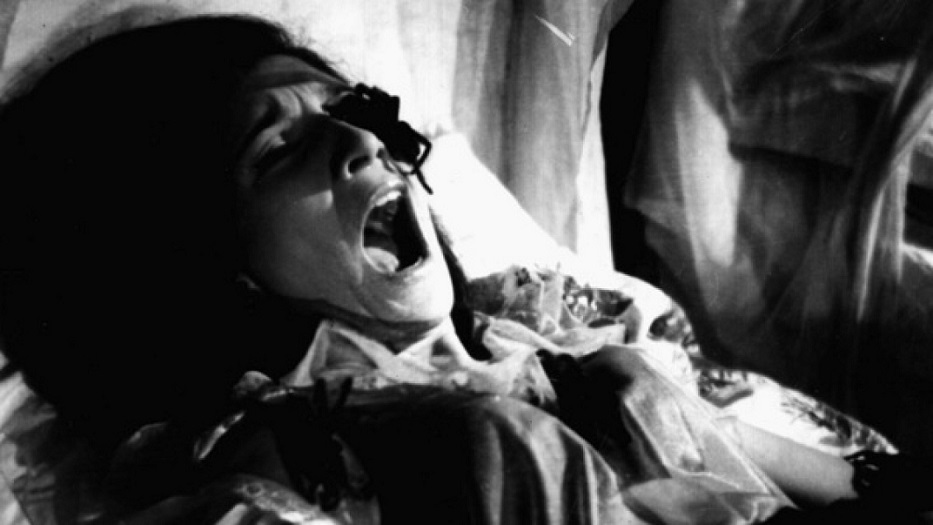
The story is exploitative, but it has an over-the-top charm and stylishness to it that keeps one watching. The slayings are even more elaborate and exaggerated. And while shot in black and white, the dream sequence is a full-color odyssey into Hell featuring bizarre and fascinating visuals. Viewers witness Coffin Joe surrounded by demons, icy (yes, icy!) caves, tortured souls, body parts writhing through walls and much more. It’s a truly surreal scene that is worth the price of admission alone.
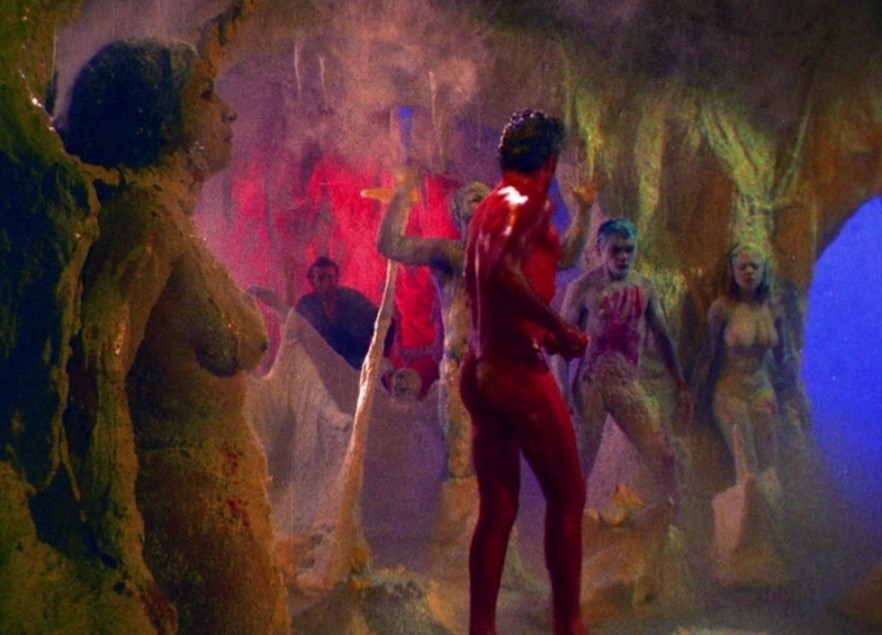
Extras on this title include an archived commentary with José Mojica Marins. Additionally, there is a documentary on Coffin Joe, his appearances in film and on TV, examining the character and some of his contradictory behaviors. Another critic who is neurodivergent explains how he became fascinated with the Coffin Joe universe and his personal take on Marins.
Also on this Blu-ray is The Strange World of Coffin Joe (1968) is an anthology that features Coffin Joe as its wraparound narrator. A couple of the tales are effective. The first one involving criminals who arrive at the home of a dollmaker and assault his attractive but dangerous daughters. It ends with a fun and grizzly sting. The final tale deals with cannibalism and includes one of the most unnerving and grotesque moments in the filmmaker’s entire catalog. It was ultimately the target of censorship from the Brazilian government and a more upbeat ending demanded by censors is included as an extra. Like the other films, the nasty villains aren’t very convincing in their arguments and rationale, but otherwise the stories are efficiently told. Trailers are also included.
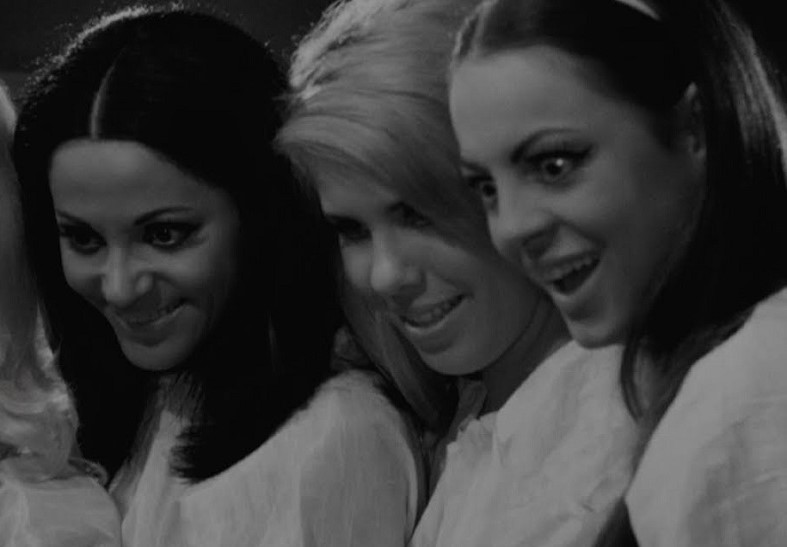
Disc 3 begins with The Awakening of the Beast (1970), a curiosity that was outright banned by the Brazilian authorities and never released. It was only decades later after the fall of the dictatorship that the picture was returned to Marins and he was able to find some distribution. The movie isn’t even a horror picture, but a story about a psychiatrist describing rampant drug use in Brazil, including the awful and shocking acts committed by various individuals in poor neighborhoods. Numerous acts depicted aren’t explicit but are unpleasant to witness. As the film progresses, it begins to suggest that the drugs themselves aren’t the cause of the violence, but rather the forbidden and cruel desires of average individuals that are simply brimming to the surface. It’s a rough watch. Coffin Joe makes an appearance in one of the dream sequences.
Bonuses include an archived filmmaker commentary and a video essay by a film scholar who examines the genre politics in his films, deciphering the occasionally confusing messages that are present. There is also a featurette detailing Marins turn into his truly strange and surreal cinematic exploits of this era. Alternate opening titles are also included.
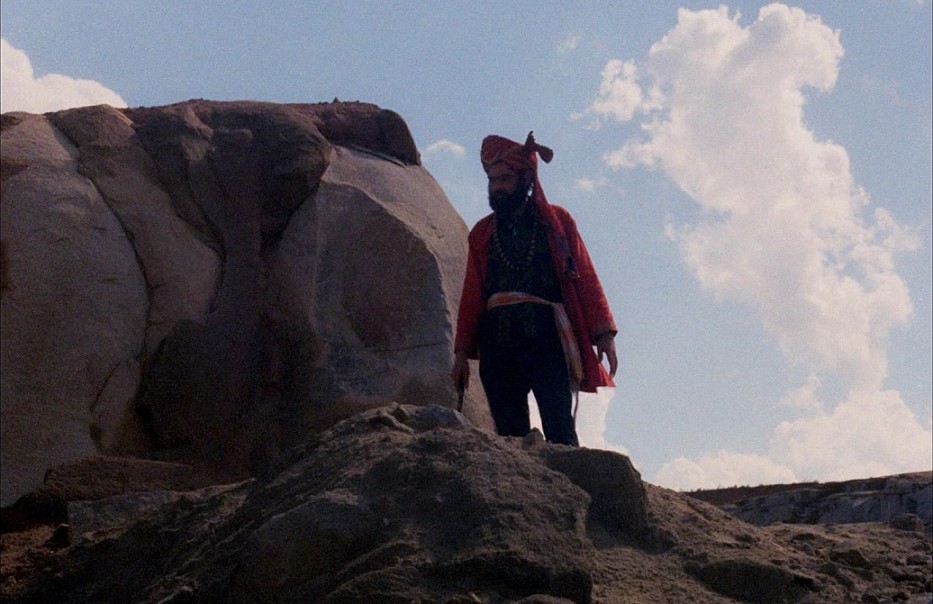
Also on disc 3 is The End of Man (1971). This is Marins’ attempt at an arthouse movie that includes strongly satirical overtones. It’s also the first full-color title in the set. This reviewer was pleasantly surprised by the project and believes that it might be the strongest film from the writer/director. He plays a quiet and mysterious figure called Finis Hominis who emerges naked from the ocean and wanders into Sao Paulo. The odd figure interacts with various citizens, often standing up for the neglected and downtrodden. The figure begins to build a following and eventually becomes a messiah figure. Marin’s performance is effectively subdued here, the character is far more likable than other roles he’s embodied and the movie has a fun little sting in the tail. It ends up being a very polished, enjoyable and thought-provoking effort. Again, this picture features a Marins commentary, as well as trailers.
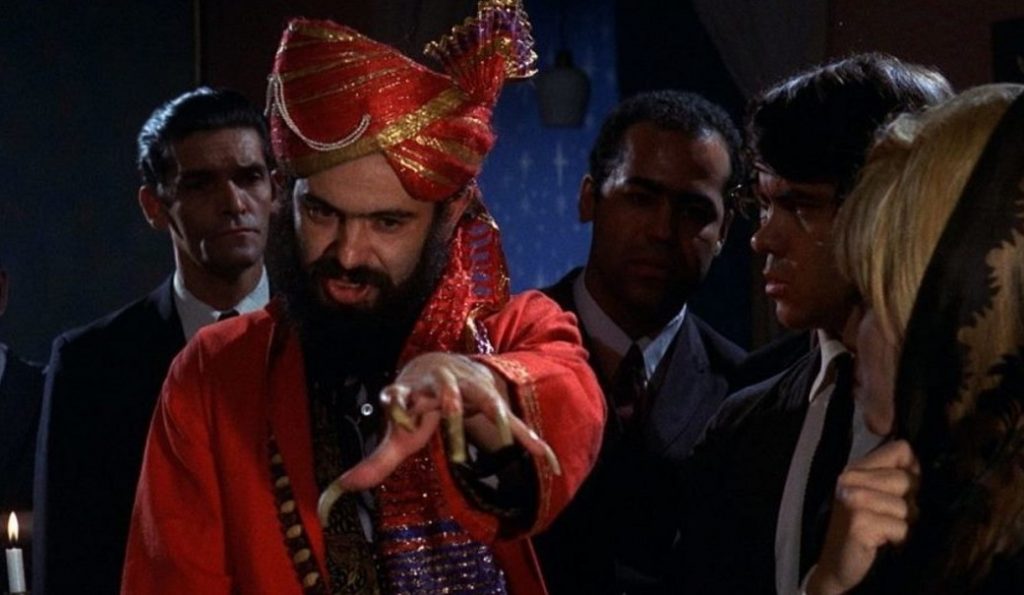
While the previous film wasn’t a big hit, his follow-up project was the sequel, When the Gods Fall Asleep (1972). It picks up the central character’s story as he returns to Sao Paulo to inspire Brazilians and help them find their true calling. He also sets out to help a very specific medical institution that is on the brink of financial collapse. The movie has a big scope (there are some impressive shots of massive crowds and civil unrest) and provides a few amusing moments, but isn’t as effective as the original. The surprise is gone and things feel a bit repetitive in this chapter. Apparently, it was another box-office flop for the filmmaker.
This title is present on the set’s 4th disc. There isn’t a commentary track for this effort, but there is a film scholar interview in which she explores the similarities between the films Marins and European and South American surrealist movements. It’s one of the best and most informative discussions included. Additionally, there is a fun interview with the co-writer of the 2008 film Embodiment of Evil about his experiences working with Marin, another critical examination of his work, and footage of Marins attending Sundance in 2001 for a retrospective screening of At Midnight I’ll Take Your Soul. At one point, he converses with R.E.M. frontman Michael Stipe.
This Blu-ray also contains The Strange Hostel of Naked Pleasures (1976), a very odd and surreal effort that sees Coffin Joe return for a brief appearance in a tale of travelers stopping at a hostel and experiencing surreal horrors. The tale is weird and wild but slow-moving, filled with even more philosophical ramblings than hoped for and suffers from a general lack of tension or urgency. There are also trailers on this disc.
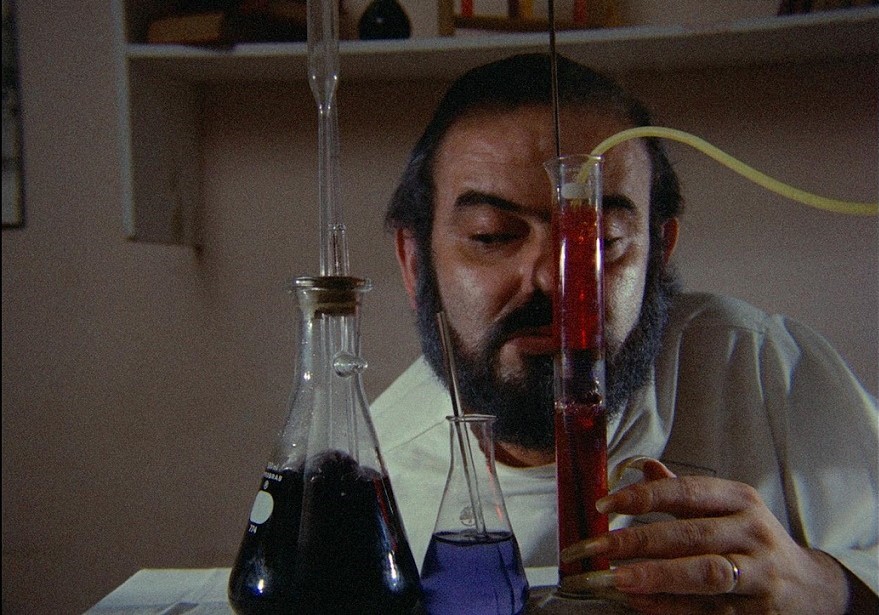
Disc 5 contains Hellish Flesh (1977), a very campy, corny effort that manages to somehow provide more fun than his other releases from this part of his career. Marins plays a work-obsessed scientist (who must have an extraordinarily difficult time doing lab tasks with his extended fingernails) whose wife takes on a lover. She and her beau plot to murder the protagonist for his fortune (he’s… well… somehow, also very wealthy, which is also a bit comical). However, their plot of killing him by dousing him with acid goes wrong when the disfigured husband survives. Then, the lover spends all of the wife’s money and she begins to feel immense guilt for her actions. Admittedly, this tale probably would have worked better as a 30-minute segment in an anthology. But it is fun and utterly ridiculous to watch, with some enjoyable conniving between characters and gooey moments.
This title includes an entertaining discussion with a filmmaker about Marins’ work and trying to determine what category exactly his films fall under. Exploitation, arthouse, horror or all of the above? There’s also a video essay on the moviemaker’s views on good and evil in his films, as well as trailers.
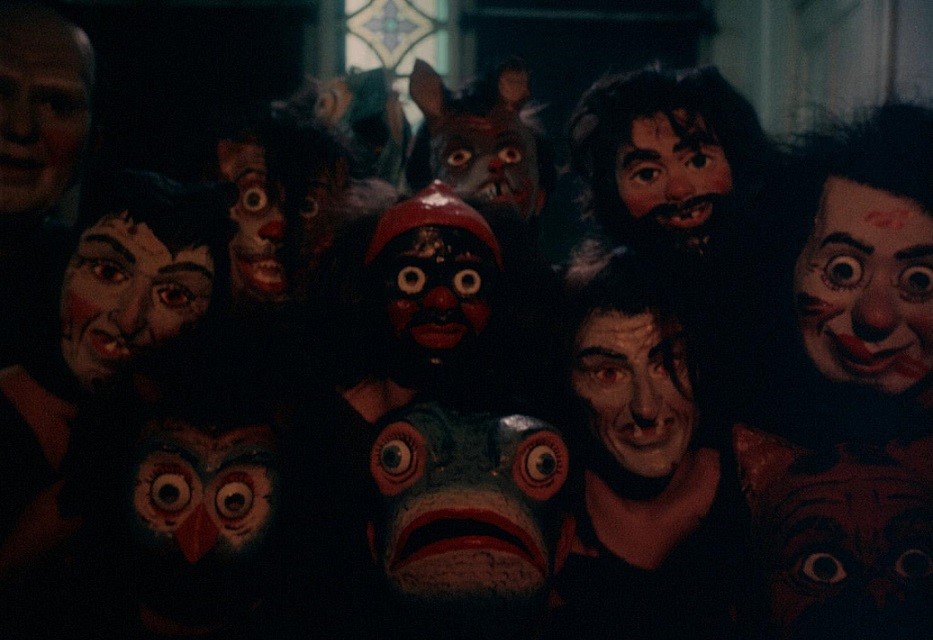
Also on the disc is Hallucinations of a Deranged Mind (1978). The plot is intriguing, as it follows a psychologist struggling from issues due to watching the character of Coffin Joe. He encounters Marins himself, who insists that his character is fictional, but the doctor has difficulty distinguishing the difference between reality and fiction. It’s an interesting concept and has a creepy moment of two, but the movie is largely composed of compilation clips from earlier films by Marins. The disc includes an archival commentary with Marins and more.
The final “Coffin Joe” film, Embodiment of Evil (2008), is one the 6th and last Blu-ray and serves as a finale for the character. As the years have passed, the evil mastermind has gained a deranged and violent group of followers who want his plans to come to fruition and will do anything to see his male heir be born. This is an extremely violence and graphic effort filled with scenes of torture. Personally, this reviewer prefers the campy and surreal touches of the previous entries, but on a technical level the low-budget feature is well-produced and I suppose it is successful in grossing-out even the most jaded of genre viewers. The disc contains a producer and co-writer commentary track, footage from the premiere, deleted scenes, an archival featurette on the visual effects, as well as storyboards, publicity materials and more.
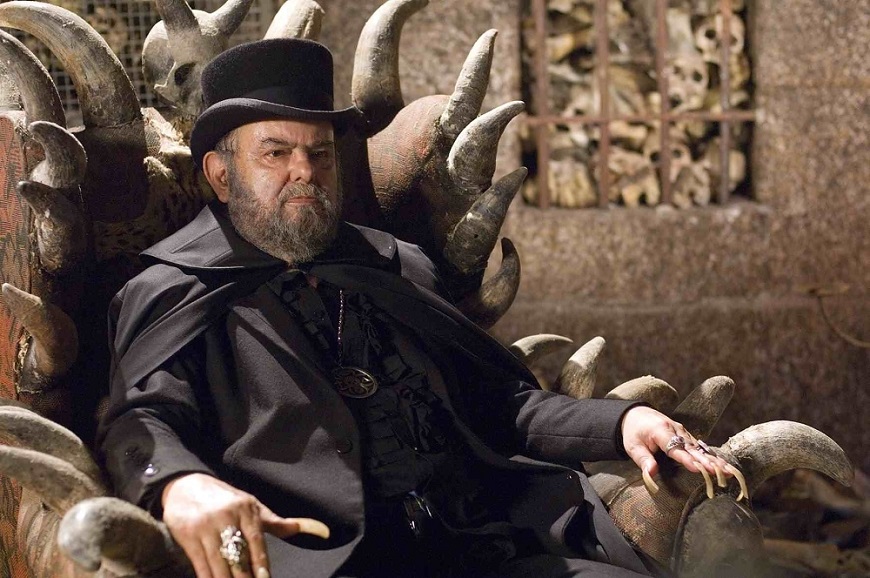
The films of José Mojica Marins are an acquired taste, but as a newbie watching many of them for the first time, I can appreciate his skill at creating unique films with a personal touch on a limited budget. And a few of them are genuinely strong, with others providing campy laughs or at least a surreal trip or two.
Arrow Video has done a wonderful job putting the set together. These films look surprisingly sharp and this is probably as good as these titles will ever look. The extras are wonderful and extremely detailed. It’s fun to listen to various theories from guest speakers on Marins, his work and his legacy. They are often contradictory and have differing opinions on what it all means, but there are many inconsistencies in the films themselves so it isn’t too much of a bother.
If you like international or very, very eccentric horror, the Blu-ray box set Inside the Mind of Coffin Joe will deliver all that you could ever want from the filmmaker, as well as all (and more) that you ever wanted to know about this eccentric José Mojica Marins and his life in the movies.


